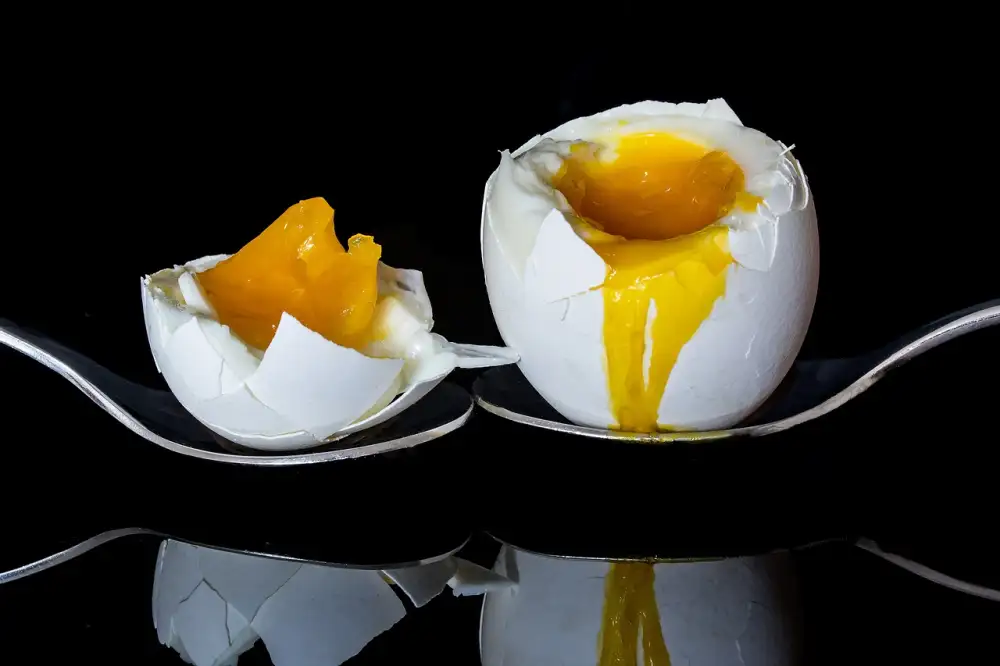Perfecting the Art of Soft Boiled Eggs: A Delightful Culinary Adventure

Soft boiled eggs are a classic breakfast staple that never fails to delight with their creamy yolks and tender whites. Unlike hard boiled eggs, soft boiled eggs have a slightly runny yolk, making them perfect for dipping toast or enjoying on their own. This cooking method involves gently boiling the eggs for a shorter period of time, resulting in a delicate texture that is both comforting and satisfying. Whether served as part of a traditional English breakfast or added to salads for extra protein, soft boiled eggs are versatile and delicious. Join us on a culinary adventure as we explore the art of perfecting soft boiled eggs.
How to Prepare Soft Boiled Eggs
Soft boiled eggs are a simple yet delightful dish that requires precision and attention to detail. To achieve the perfect soft boiled egg, start by bringing a pot of water to a gentle boil. Using a slotted spoon, carefully lower the eggs into the water one at a time. It's essential to use eggs at room temperature to prevent cracking when they are added to the hot water.
Once the eggs are in the boiling water, set a timer for 6-7 minutes for a runny yolk or 8-9 minutes for a slightly firmer yolk. Timing is crucial in achieving the desired consistency of the yolk, so be sure to monitor closely.
After the eggs have cooked for the appropriate time, immediately transfer them to an ice bath to stop the cooking process. This will help ensure that the yolks remain creamy and luscious. Gently tap the eggs on a hard surface and peel under running water for easy removal of the shell.
With these simple steps, you can master the art of preparing perfectly soft boiled eggs every time.
Tips for Perfect Soft Boiled Eggs
1. Use eggs at room temperature: Starting with eggs that are not straight from the fridge helps them cook more evenly.
2. Timing is key: For a soft boiled egg with a runny yolk and set whites, boil for 6-7 minutes.
3. Use a timer: To ensure consistent results, use a timer to track the cooking time accurately.
4. Shock in ice water: After boiling, immediately transfer the eggs to an ice water bath to stop the cooking process and make them easier to peel.
5. Gently crack and peel: Tap the cooked egg gently on a hard surface before peeling to help release the shell easily.
6. Experiment with different sizes of eggs: Larger eggs may require slightly longer cooking times, so adjust accordingly.
By following these tips, you can achieve perfectly cooked soft boiled eggs every time, ready to be enjoyed in various dishes or simply on their own as a nutritious snack.
Serving Suggestions for Soft Boiled Eggs
Soft boiled eggs are incredibly versatile and can be enjoyed in various ways. One classic way to serve them is simply with a sprinkle of salt and pepper, accompanied by buttered toast for dipping. Another popular option is to place the soft boiled egg on top of a salad for added protein and creaminess.
Soft boiled eggs also pair well with dishes like ramen or noodles, adding richness to the broth. They can be sliced in half and placed on top of avocado toast for a satisfying breakfast or snack. For a more elegant presentation, try serving soft boiled eggs on a bed of asparagus or sautéed greens.
Experiment with different seasonings such as chili flakes, truffle oil, or fresh herbs to enhance the flavor of your soft boiled eggs. The creamy yolk makes a delicious sauce when mixed with grains like quinoa or rice. Get creative in the kitchen and discover new ways to enjoy this simple yet delightful dish!
Nutritional Benefits of Soft Boiled Eggs
Soft boiled eggs are not only a delicious culinary delight but also a powerhouse of nutrition. They are packed with high-quality proteins, essential vitamins such as vitamin A, D, E, and B-complex vitamins like B12 and riboflavin. Additionally, they are a rich source of minerals like iron, zinc, and selenium. Soft boiled eggs are low in calories but high in healthy fats which can aid in maintaining a balanced diet. The egg whites contain almost all the protein while the yolks provide healthy fats and important nutrients like choline which is beneficial for brain health. Including soft boiled eggs in your diet can contribute to overall health and well-being due to their impressive nutritional profile.
Variations and Flavors for Soft Boiled Eggs
Soft boiled eggs are incredibly versatile and can be enjoyed in various ways to suit different tastes. One popular variation is adding a sprinkle of salt and pepper on top of the egg before digging in, enhancing its natural flavors. Another delicious option is to drizzle some truffle oil over the soft boiled egg for a luxurious touch. For those who enjoy a bit of heat, a dash of hot sauce or chili flakes can add a spicy kick to the creamy yolk. Additionally, experimenting with different herbs such as chives, dill, or parsley can elevate the overall taste profile of the soft boiled egg dish. These simple additions can transform a basic soft boiled egg into a gourmet culinary experience that will delight your taste buds.
Common Mistakes to Avoid When Making Soft Boiled Eggs
1. Overcooking: One of the most common mistakes is overcooking soft boiled eggs, which can result in a hard yolk and rubbery whites. To achieve the perfect soft boiled egg, it is important to time the cooking process accurately.
2. Not using room temperature eggs: Starting with cold eggs can lead to uneven cooking as the sudden temperature change can cause the eggs to crack or cook unevenly. It is best to use eggs that are at room temperature before boiling.
3. Skipping the ice bath: After boiling, some people forget to transfer the eggs immediately into an ice water bath to stop the cooking process. This step helps in preventing overcooking and ensures a creamy yolk consistency.
4. Inconsistent egg sizes: Using eggs of different sizes can result in varying cooking times and inconsistent results. It is recommended to use eggs of similar sizes for uniform cooking.
5. Not piercing the eggshell: Failing to pierce the bottom of the egg before boiling can lead to cracking during cooking, resulting in egg white leakage and an uneven appearance.
By avoiding these common mistakes, you can master the art of preparing perfect soft boiled eggs every time, ensuring a delightful culinary experience with each bite.
In conclusion, soft boiled eggs are a simple yet versatile dish that can be enjoyed at any time of the day. They offer a perfect balance between a runny yolk and a firm white, making them a delightful addition to any meal. By following the proper cooking techniques and tips, you can achieve the perfect soft boiled egg every time. Whether served on toast for breakfast, in salads for lunch, or as a topping for ramen for dinner, soft boiled eggs add a creamy richness to any dish. Incorporating them into your diet also provides essential nutrients such as protein, vitamins, and minerals. So next time you're looking for a delicious and nutritious meal option, consider mastering the art of soft boiled eggs - your taste buds will thank you!
Published: 09. 05. 2024
Category: Food



